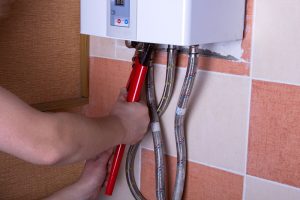 When our customers are looking to have a new water heater installed, we often recommend considering the tankless water heater. There are a number of advantages to using this style of water heater, like lower energy bills, longer equipment life, and an unlimited supply of hot water. If you’re considering a system upgrade, you might also benefit from learning how seasonal savings can enhance home comfort.
When our customers are looking to have a new water heater installed, we often recommend considering the tankless water heater. There are a number of advantages to using this style of water heater, like lower energy bills, longer equipment life, and an unlimited supply of hot water. If you’re considering a system upgrade, you might also benefit from learning how seasonal savings can enhance home comfort.
Another benefit of a tankless water heater is that it typically encounters fewer repairs on average that the conventional storage tank water heater. This is because they don’t deal with the stress of continual energy usage to keep the water inside the tank heated. It does less work, and therefore a tankless water heater doesn’t wear out as quickly.
However, that doesn’t mean that they are completely immune to problems. And when a problem does occur, you will want someone who specializes in professional plumbing in Hudson, IA. That’s what we’re here for! In the meantime, though, ready on to learn more about these systems.
Common Problems With Tankless Water Heaters
To answer this question, it’s important that we first explain how a tankless water heater operates. It functions by moving water from the hot water line through a heat exchanger, where heat from the gas jets is transferred into the water. This on-demand functionality is a big part of the reason that tankless water heaters are so appealing to our customers.
But, just like a tank system, hard water can cause a mineral buildup of calcium and magnesium. This may seem harmless—at it’s not necessarily unhealthy to humans or pets—but these mineral deposits can infiltrate the heat exchanger and cause the outlets to become clogged. To understand more about this, check out how sediment builds up in your water heater and why it matters.
If you discover low water pressure coming from your hot water faucets, mineral buildup may very well be the reason. You need to get in contact with a professional plumber so we can clear out any obstructions, and it may also be a good idea to consider the installation of a whole-house water softener so the problem doesn’t repeat.
Another possible issue a tankless water heater might face is a leak within the heat exchanger. If this occurs, the escaping water can put the entire system in danger of corrosion. And a corroded water heater almost always needs to be replaced. If a tankless system can’t properly vent out exhaust gases from the heat exchanger, it can cause that heat exchanger to corrode, with can be potentially harmful.
We have no intention of talking you out of purchasing a tankless water heater, but just like any important piece of equipment or appliance for your home, it’s important that you know what can go wrong and how to prevent against it. To protect your tankless water heater, and therefore your home, it’s a good idea to schedule maintenance on a regular basis. Discover how upgrading your system can bring you long-term comfort and savings. You can talk to a pro about how often your tankless tune-ups should be scheduled, but a good rule of thumb to go by is once a year maintenance.
At Dalton Plumbing, Heating, Cooling, Electric and Fireplaces, Inc., your comfort is our promise! To set up an appointment, give us a call at the number above, email customerservice@daltonphc.com or schedule an appointment online.
